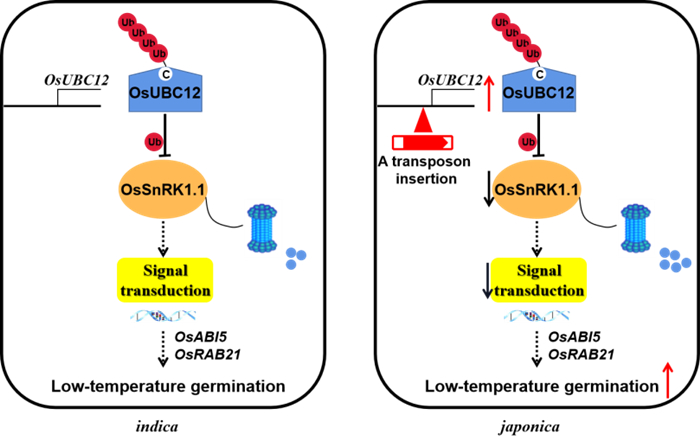Low-temperature germination (LTG) is an important agronomic trait for rice (Oryza sativa). Japonica rice generally has greater capacity for germination at low temperatures than the indica subpopulation. However, the genetic basis and molecular mechanisms underlying this complex trait are poorly understood.
Recently, a research team led by Prof. FANG Jun from the Key Laboratory of Soybean Molecular Design Breeding, State Key Laboratory of Black Soils Conservation and Utilization, Northeast Institute of Geography and Agroecology, Chinese Academy of Sciences (CAS) revealed that OsUBC12, encoding an E2 ubiquitin-conjugating enzyme, increases low-temperature germinability in japonica, owing to a transposon insertion in its promoter enhances its expression, and further shed light on the underlying mechanisms of UBC12 regulating LTG and provide genetic reference points for improving LTG in indica rice.
This work was published in Nature Communications on March. 13.
According to the researchers, a transposon insertion in the japonica OsUBC12 promoter that activates OsUBC12 expression and increases cold tolerance during germination. Natural variation analysis reveal transposon insertion in the OsUBC12 promoter mainly in the japonica lineage. The variation detection in eight representative two-line male sterile lines suggests the existence of this allele introgression by indica-japonica hybridization breeding, and varieties carrying the japonica OsUBC12 locus (transposon insertion) have higher low-temperature germinability than varieties without the locus.
Further molecular analysis show that OsUBC12 negatively regulate ABA signaling. OsUBC12-regulated seed germination and ABA signaling mainly depend on a conserved active site required for ubiquitin-conjugating enzyme activity. Furthermore, OsUBC12 directly associates with rice SUCROSE NON-FERMENTING 1-RELATED PROTEIN KINASE 1.1 (OsSnRK1.1), promoting its degradation. OsSnRK1.1 inhibits LTG by enhancing ABA signaling and acts downstream of OsUBC12, showing that OsUBC12 negatively regulate ABA signaling by promoting the proteasomal degradation of OsSnRK1.1, thus accelerating LTG.
This study propose a model to explain how OsUBC12 regulates LTG. According to the model, OsSnRK1.1 functions as a downstream key regulator to enhance ABA responses by upregulating the expression of ABA-signaling-related genes such as OsABI5 and OsRAB21, thus inhibiting LTG. OsUBC12, an E2 enzyme for K48-linked polyubiquitination, recruits and degrades OsSnRK1.1. Compared with indica rice, a transposon insertion in the japonica OsUBC12 promoter activates its expression. Increased OsUBC12 levels further promote the degradation of OsSnRK1.1, thereby weakening OsSnRK1.1-regulated ABA signaling and enhancing the low-temperature germinability of japonica rice (Figure 1).
The study broadens our understanding of the regulatory functions of rice E2 UBC enzymes involved in ABA signaling and LTG, and provide a potential genetic locus that may be applied to improve the LTG of indica rice.

Figure 1 The model of OsUBC12 involved in regulating LTG of rice
Keyword:Low-temperature germination,Seed germination,Ubiquitin
Contact:
Prof. Fang Jun
Northeast Institute of Geography and Agroecology, Chinese Academy of Sciences
E-mail: fangjun@iga.ac.cn
Reference:
Chuanzhong Zhang, Hongru Wang, Xiaojie Tian, Xinyan Lin, Yunfei Han, Zhongmin Han, Hanjing Sha, Jia Liu, Jianfeng Liu, Jian Zhang, Qingyun Bu, Jun Fang*. A transposon insertion in the promoter of OsUBC12 enhances cold tolerance during japonica rice germination. Nature Communications, 2024, 15, 2211.
https://www.nature.com/articles/s41467-024-46420-7